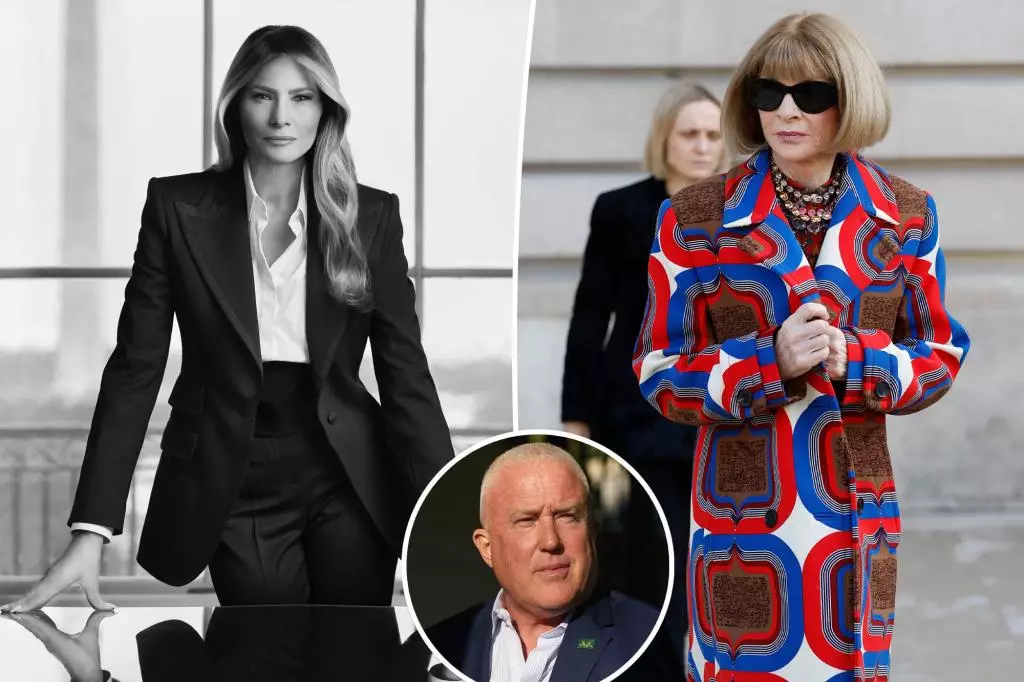In recent days, tensions have erupted in the world of fashion and politics, as friends of Melania Trump have taken a stand against Vogue Magazine and its editor Anna Wintour. The expression “blood in the water” could well describe the situation as supporters of the former first lady rally against a scathing fashion op-ed that criticized her image and presence. The article in question, featured in Vogue, was perceived not merely as a critique of fashion choices but rather as a biting commentary on her role as First Lady of the United States. This article not only exposed previously existing fault lines between political supporters and the fashion elite, but it also cast a glaring light on the insecurities and challenges faced by public figures.
The Backlash from Melania’s Allies
In the aftermath of Vogue’s critical take, individuals close to Melania Trump have vocally defended her, with Bill White, a confidant of the former first lady and nominee for US Ambassador to Belgium, leading the charge. White has publicly denounced Vogue’s commentary, suggesting that it reflects a broader disdain for Trump and even calling for the cancellation of subscriptions to the magazine. Such actions reveal a segment of society that feels alienated not only by political narratives but also by cultural institutions that they believe should be more inclusive. The incident showcases how fashion, a seemingly superficial domain, serves as a battleground for deeper ideological and cultural conflicts, echoing sentiments of loyalty to the First Lady and disdain towards a perceived elitist media.
Vogue’s sharp words noted that Melania Trump appeared more like a contestant on “The Apprentice” than the country’s First Lady, a statement laden with implications about her public representation. Critics used phrasing that could be interpreted as belittling, insinuating that her poise and presentation lacked the dignity expected of someone in such a significant public position. This sort of analysis raises questions about the valuation of appearances in political personas; it examines whether a First Lady is expected to conform to certain aesthetic standards while being critiqued for not embodying them. As fashion commentators, the expectations placed on public figures can often create a double bind, but White counters these critiques by emphasizing Melania’s elegance and multilingual abilities, attempting to shift the conversation towards appreciation for her capabilities and character.
Melania’s Position in the Fashion Narrative
Interestingly, while Melania Trump has a history in modeling and aesthetics, her recent comments express a dismissive attitude towards the notion of appearing on Vogue’s cover. “We have so many other important things to do than to be on the cover of any magazine,” she stated in an interview, suggesting a prioritization of role over vanity. Her remarks serve both as a subtle rejection of the fashion industry’s standards and an assertion of her identity defined not by magazine accolades but by her duties as a mother and wife. This duality of being a public figure while aiming for authenticity creates friction in how she is perceived and how she perceives herself.
Additionally, whispers of resentment within fashion circles suggest that many designers have shunned Melania, leaving her with limited options for attire, which only amplifies the narrative that she is an outcast in that realm. Some supporters express a lack of concern for what the fashion world thinks, arguing that Melania has moved beyond the superficial expectations that typically accompany her role. Nevertheless, this discontent showcases the complex relationship between political figures and the industries that help shape their public personas.
The Bigger Picture: Society’s Standards
The conflict between Melania Trump and Anna Wintour encapsulates broader societal themes such as class, reputation, and the politics of fashion. The vitriol aimed at Trump reveals a deeper cultural commentary on how women, especially in positions of power, are scrutinized not just for their policies or personal attributes but for their sartorial choices as well. As public discourse increasingly intertwines with fashion and appearance, it opens up questions about the equity of this scrutiny and the role each of us plays in perpetuating societal standards. Whether one admires Melania or not, her experience serves as a prism through which to examine the judgments faced by all women who dare to reside in the limelight.
In this continually evolving narrative, one thing remains clear: in today’s polarized climate, the intersections of politics, fashion, and identity are fraught with challenges, as public figures navigate the often treacherous waters between appearance and substance.
